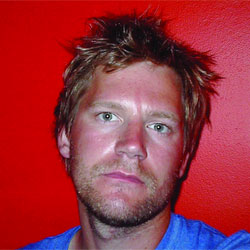North of lumberless land,
we made the animals fight for us.
Sore warped beasts pinched off
the rag-and-bone rack, ones that
bit by barbed bit were forced to
fisticuffs in the scrub slump of hills.
With a hairline rapture these animals
came and went about our days,
leaving their young to defend
the palaces they were forced from
for us. These carousel mammals walked
skewered to the pole. With forepaws
in kid gloves they pricked ears when
tinder sticks lapped the brass-green
kettledrums, drums that laid down the miles
to their relevant demise.
After rock-picking, the fields
were pocked. My uncle with a hazel switch
kicking his mule’s hide. My uncle
after twenty more one-mores, his
hat-hidden forehead facing hindsight
as he ox-eyed the ten-ton dewline
that girdled the drumlins. His
cat-o’-nine-tailed spine
humped along the timber-slab paths,
his blinkered mule craning at the headlands;
his pelt hides bone anchor points, marrow levers,
sanguine pulleys. An oilcloth dropped
on his doily-thin, God-given name.
And that’s our house, dog-eared
by a balepick hooked in the gatepost
like a tongue licked on winter tin. From
a Caesarean cloudbelly, grey hounds of rain
tear messenger pigeons down to half-tilled fallow.
From the crown of the fox tower I pull my scope
from its rat-hide case, come in close on Uncle,
that mule under his loins scraping home
in ankle drags. The gully was as far as I got
by eye. The rest I only heard,
the noise I’m writing to forget
as the barren hounds got onto him.
Notes on the Poem
Let us perform an archaeological dig to unearth and admire the myriad riches in a Jeramy Dodds poem. Let us dig into "Crown Land" from Dodds' 2009 Griffin Poetry Prize shortlisted collection Crabwise to the Hounds. In fact, we don't have to excavate far to reveal gems. There is sly humour: "These carousel mammals walked skewered to the pole." The humour is sometimes perverse - making those gems twinkle even more brightly - such as: "after twenty more one-mores" and "like a tongue licked on winter tin." There are sonic pleasures, such as: "After rock-picking, the fields were pocked." There is almost shockingly vivid imagery: "From a Caesarean cloudbelly, grey hounds of rain tear messenger pigeons down to half-tilled fallow." We come honestly by the notion of scrutinizing a Dodds poem in an archaeological fashion, as interviews such as this 2010 piece from Open Letters Monthly have revealed the influences of the poet's background in that discipline. Intriguingly, Dodds comments that, "These types of poems work in reverse to archaeology for me. I wasn’t taking pieces of a material past and trying to re-assemble them into a narrative. I was taking an idea of my own past and those of an invented narrative, shattering the narrative, and sowing the shards in myth, image and metaphor." what beautiful shards this poem has provided for our delight and fascination.
